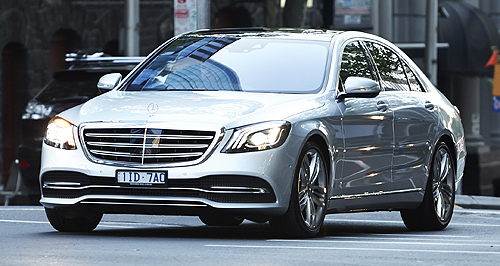Make / Model Search
News - Mercedes-BenzEnd of LCT in sight: Mercedes-BenzTax break: With the abolition of the luxury car tax, Mercedes models ranging from the AMG A45 (left) all the way up to the flagship S-Class (below) will become cheaper to purchase. Mercedes-Benz expects luxury car tax to be put to pasture as early as 201910 Nov 2017 By TUNG NGUYEN MERCEDES-BENZ Australia/Pacific is preparing for the end of the luxury car tax (LCT), which it expects will be abolished in the next two to three years and will make most of its models more affordable than ever. Speaking with Australian journalists in Stuttgart, Mercedes-Benz Australia/Pacific public relations, product and corporate communications senior manager David McCarthy said the death of the LCT has been a long time coming. “I feel confident (by) 2019/2020 there won’t be an LCT,” he said. “And that will have been an eleven year battle. “LCT will be a casualty in an (European Union) EU free trade agreement. Anyone who tells you otherwise, is believing in alternative facts – that’s the reality.” Currently, the LCT threshold applies to cars priced above $65,094 that consume more than 7.0 litres per 100km, and $75,526 for all other vehicles, at a rate of 33 per cent of the amount above the limit. The LCT was introduced nearly 18 years ago as a means to entice consumers to Australian-made vehicles, including the Holden Commodore, Toyota Camry and Ford Territory. However, with Australian vehicle manufacturing ending this year following the closure of Toyota and Holden factories – as well as Ford’s last year – Mr McCarthy said he is “not worried that it will go the wrong way”, but the biggest hurdle to overcome was how to apply the change. “How the government does it, how they phase it in, that’s the challenge, but it will go,” he said. “It’s currently 33 per cent. My personal view is that you want to implement it over a three-year period, so 33, 22, 11, zero. “Otherwise, you’re going to have a lot of dislocation in the market and no one is going to shed a tear over OEMs suffering, but the government potentially would lose a lot of revenue. “The interest is for it to be a smooth, gradual transition. No free trade agreement implements all its parts from day one, it’s staggered, so the economy can adjust and supplies can adjust. “The challenge with working on the removal of LCT would be a great one.” Mr McCarthy cited the recently scuttled parallel import proposition as a basis for the process the government could take to remove the LCT, and that the loss of revenue from the tariff would be offset by more spending and employment. “They know one of the big factors in the parallel import decision was the ability for that to have a very bad effect on employment and schools and training in the network, so they understood that – they didn’t believe it originally, but they did their research, they spoke to the industry, they’ll do the same with this,” he said. “And the automotive sector is a big sector, it’s a big employer, it’s a big contributor of tax, whether that’s GST, whether that’s income tax, you don’t want to dislocate that. “They’re always prepared to trade off, as they have in other free trade agreements, a reduction in revenue in some areas for an increase in economic activity in others.” In addition to the LCT, Mr McCarthy said he believed import duty would also need to be removed to keep vehicle pricing fair, regardless of where the vehicles are built and sourced. “Ultimately import duty will go as well,” he said. “I think import duty on cars will also have to go, because otherwise you will be left with a couple of places where cars are sourced from that will still pay import duty because that country is not in the EU or that country might be a Commonwealth country.” Although Mr McCarthy said he expects the change to take place in the next two to three years, he anticipates it will happen despite a potential change in government leadership. “Both the major parties are committed to an EU free trade agreement in the framework that’s been discussed,” he said. “There’s always a bit of finessing around some of it, but they are both parties that support low trade barriers and free trade.”  Read more10th of November 2017  Mercedes-AMG sales expected to hit 7000Another record year predicted for AMG as Mercedes-Benz sales to land near 40,0001st of September 2016  Hyundai supports LCT endTransitioning auto industry could follow tobacco industry trend, says Hyundai |
Click to shareMercedes-Benz articlesResearch Mercedes-Benz Motor industry news |











Facebook Twitter Instagram